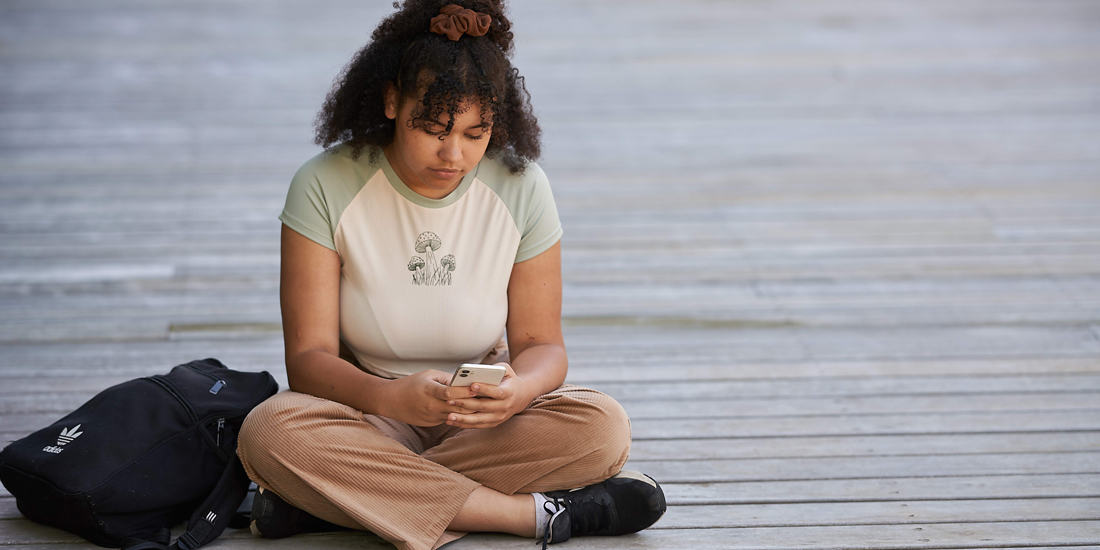
A survey of young Australians during COVID-19 lockdowns found more than 40 per cent reported severe levels of anxiety and depression, and two-thirds increased their social media use.
The online survey of 371 people aged 16–25 found that 86 per cent believed the COVID-19 pandemic had a negative impact on their mental health. The survey findings have been published in The International Journal of Environmental Research and Public Health.
Lead author of the paper, Orygen’s Dr Eleanor Bailey said the findings were important for understanding the impact of the pandemic on young people’s mental health, as well as how social media might be used to provide support.
“Perhaps unsurprisingly, we found young people report overwhelmingly negative impacts of the pandemic,” Dr Bailey said.
“We also found that they turn to social media more during this time, and use social media to seek and provide support, which has implications for how we might be able to support young people during stressful times such as pandemics.”
The online survey was advertised via social media to young people across Australia from June to October 2020, coinciding with state and federal COVID-19 lockdown restrictions. Advertising was specifically targeted at young Victorians from August to October during ongoing restrictions there.
The survey incorporated the Depression Anxiety Stress Scales (DASS-21) – a self-report questionnaire measuring negative emotional states over a two-week period.
It found that depression and anxiety levels were severe or very severe for more than 40 per cent of the respondents (depression: 41.8 per cent; anxiety: 41.0 per cent) while serious stress levels impacted 30.5 per cent.
Those identifying as gender-diverse experienced significantly higher levels of depression, anxiety and stress than females and males.
“This finding fits with what we know already about levels of psychological distress in gender-diverse young people, and really drives home the need to provide support to this group, both in general and during these particularly challenging periods,” Dr Bailey said.
The study also looked at changes in the social media usage of young people, and how that may have impacted mental health.
It found that the majority of respondents (96.1 per cent) used social media every day, with almost half (46.2 per cent) using social media for 3–4 hours a day, and nearly 10 per cent using it more than seven hours a day.
Significantly, two-thirds of participants (65.9 per cent) reported increasing their social media usage since the beginning of the COVID-19 pandemic, with 32 per cent using it much more.
With such significant increases in both mental ill-health and social media usage, Dr Bailey and her team were keen to look at any associations between the two.
Analysis showed that depression scores were significantly higher in those who used social media for more than seven hours, compared to other groups.
Anxiety and stress scores were also higher among those spending seven hours or more on social media.
“We can’t say at this stage whether spending a lot of time on social media actually causes higher levels of psychological distress, or whether young people experiencing high levels of distress tend to spend more time on social media,” Dr Bailey said.
“What we can say is that there appears to be a relationship between the two which we need to examine more closely, and which might have prevention and treatment implications.”
But social media usage wasn’t all bad news.
The survey found that more than a third (36 per cent) of young people actually used social media to support themselves when it came to coping with thoughts of suicide or self-harm; more than half (50.4 per cent) had used social media to support others.
“This tells us that there is a real opportunity to use social media for good, for example by ensuring young people have the right skills and support to be able to safety and effectively seek and provide support on social media,” Dr Bailey said.
“Our team has already developed the #chatsafe guidelines and social media campaign, designed to support young people to safely communicate online about suicide, and this study has shed further light on how we might target #chatsafe content to vulnerable groups as well as during difficult periods such as pandemics.”
Orygen plans to use the findings to build on the #chatsafe program, and to continue to work with social media companies on how to best support vulnerable young people during the COVID-19 pandemic and beyond.
“We hope that by promoting the delivery of targeted content about mental health and suicide prevention via social media during pandemics, this research will ultimately lead to improved outcomes for young people,” Dr Bailey said.
The study was funded by Future Generation Global.